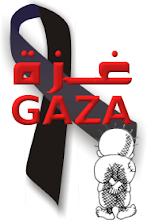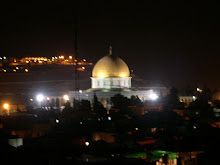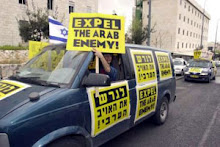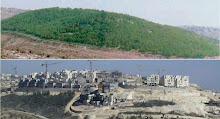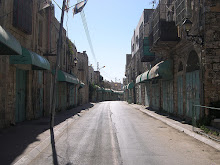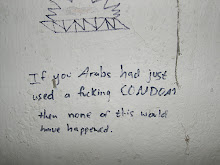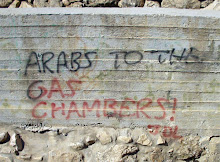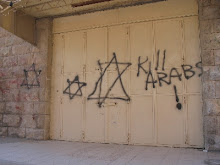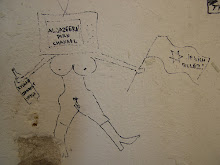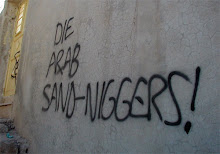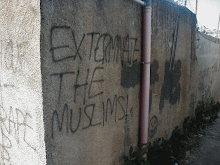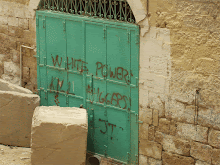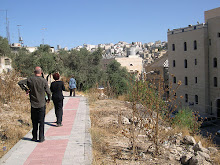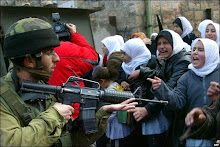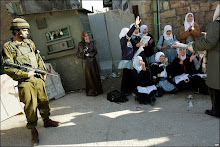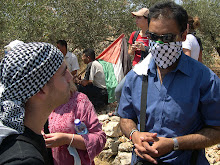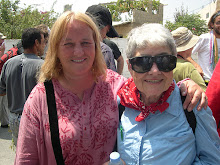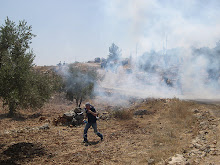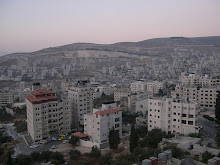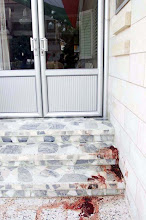 We hail a servees from outside the hotel and are soon on our way to Nablus. As I take in the rocky landscape, I cannot help thinking that Palestine has all it takes to be a top tourist destination. Spectacular scenery, holy sites and mouthwatering cuisine. And, above all, the most friendly and welcoming people I have ever known. Tragically, all its name conjures up for most people are images of violence and suffering.
We hail a servees from outside the hotel and are soon on our way to Nablus. As I take in the rocky landscape, I cannot help thinking that Palestine has all it takes to be a top tourist destination. Spectacular scenery, holy sites and mouthwatering cuisine. And, above all, the most friendly and welcoming people I have ever known. Tragically, all its name conjures up for most people are images of violence and suffering.My reverie is rudely interrupted when we reach Huwwara- the most infamous checkpoint in Palestine. Unfortunately, the word 'checkpoint' sounds so benign that it hardly conveys the horror of the place. Have you seen a cattle shed crammed full of animals? With only one gate to get out, guarded by a farmer with a stick? Well, just replace him with an Israeli soldier with a rifle- and the animals with Palestinians- and you're not far. Nowadays, Israel wishes to be seen to be lifting some of the restrictions on movement- as part of this, getting into Nablus through Huwwara is much less trouble than it used to be. The only reason for this is that Israel is bending over backwards to prop up and manipulate the Fatah government in the West Bank. By trumpeting cosmetic changes such as the partial relaxing of checkpoints as 'major concessions', they think they can get what they want out of Fatah.
However getting out of Nablus via Huwwara remains a nightmare and we see a queue extending for half a kilometre out of the cramped shed and into the merciless sun. One by one, the Palestinians are called forwards and their documents are inspected. Some get through, others are turned back. Depending on the mood of the soldier. Fifty yards to the right is a brand new Jewish settler-only highway with fancy cars whizzing past. I am consumed by rage. Some people say the settlers simply don't know what the Palestinians go through every day. Nonsense- they just need to look out of their windows.
We drag our belongings through the turnstiles and hail a taxi to our hotel. It is immediately evident that Nablus is a world apart from Ramallah. Nestling in a valley, its picturesque location is also its biggest misfortune. Perched on the hills surrounding the city are Jewish settlements and Israeli military outposts. Snipers can fire into the city at will.
Nablus used to be the commercial capital of Palestine. Then it became the capital of resistance during the Intifada (the Israelis will tell you it is the capital of terrorism). Today, Nablus continues to resist- but strangled by occupation, it has become the capital of poverty and unemployment.
The Yasmin Hotel is bang in the middle of the old city. It is clean and comfortable. My friend in Nablus- Saed Abu-Hijleh- arrives to greet us. How I met Saed is a story in itself. A few months ago I saw a documentary called Sucha Normal Thing. Soon after this I attended a talk in Manchester by a lecturer from An-Najah University- Sa'ed. I immediately recognized him from the film, and told him about our planned trip to Palestine. He offered to be our host in Nablus. Sa'ed is a warm, boisterous man- but behind that facade is a heartbreaking story, which he narrates in the film. I shall come to that later.
He takes us to meet the dynamic Anan Qadri, General Director of the Nablus Governorate. We are received warmly- by now, we are familiar with the routine in Palestine. No matter where you go, first, bottles of mineral water will appear. Once you have quenched your thirst, orange juice arrives. This will be followed by mint tea. If you think English breakfast tea was refreshing, try this- it's the perfect wake-up formula.
Anan describes how the emergency services try to cope with Israeli attacks. As routes to hospitals are usually blocked in the aftermath of of an incursion, many wounded were dying without receiving medical attention. To deal with this a 'mobile hospital' with anaesthetists, surgeons and technicians has been developed- this tries to deliver care at the site of an incident.
There are an incredible 58 checkpoints around Nablus. The very day we arrived in Nablus, the Minister of Tourism was barred from crossing Huwwara checkpoint. Anan tells us that it is nearly impossible for people to visit friends and family. Infants cannot reach clinics to receive vaccinations. Unemployment is at a record high of 75% (the national average is 52%). Thousands of people have left Nablus- some have fled Palestine.
She tells us that once, in 2002, the Israelis imposed a continuous curfew for 110 days. All shops and educational institutions were closed. However the resilient Palestinians continued to educate their children by setting up a 'basement' school in each neighbourhood. During this period, 100 Nablusis were killed.
Israeli military incursions still occur every night- the sound of gunfire has become background music for the residents of Nablus. Anan and Saed tell us that they can't remember the last time they had a sound sleep- between 12 and 5 every night, shelling and shooting is continuous and people start their day exhausted and irritable. The excuse the Israelis use is that they are looking for 'wanted' people. They recently used this pretext to destroy an apartment block housing 25 families.
Anan warns that if a just solution is not reached soon, both Palestine and Israel will pay a heavy price because the Palestinians' patience is quickly wearing thin.
We leave Anan and take a brief rest in the hotel. We then proceed for a sumptuous dinner at a rooftop restaurant with commanding a spectacular view of the city and its surrounding hills. Saed insists on footing the bill- 'you are my guests'.
Saed then walks us to his house and relives for us the nightmare of October 11, 2002. That evening, his mother Shaden was embroidering. She was sitting on a chair just outside her front door. All of a sudden a group of Israeli soldiers pulled up in a jeep and, with no provocation whatsoever, started spraying bullets at Shaden. Her body received 14 hollow-point bullets (these are banned under international law, as they explode once they enter the body). She died on the spot, while Saed and his father were injured. The bullet marks on the wall bear testimony to that horrific day. The family have kept the shattered glass front door intact.
This unprovoked, cold-blooded killing of a 62-year-old philanthropist and peace activist provoked international condemnation. The Israelis promised an investigation- to date, there has been no report. For more information and pictures, visit http://www.remembershaden.org/.
The story stuns us into silence, which is only broken when Saed lightens the mood by telling jokes. We spend what remains of the evening drinking sage tea outside the house, overlooking the city in all its nighttime glory. Saed points out the military posts encircling Nablus.
We go back to the al-Yasmin. I use their computer to write the blog, while the others retire early. Every few minutes, I hear fireworks going off. However I soon realize that it is gunfire. The tanks have rolled in, probably to one of the camps. Near me, the hotel staff go about their work as if nothing has happened. 'Yes, it is gunfire. So what? This happens every night.'
Welcome to Nablus.


